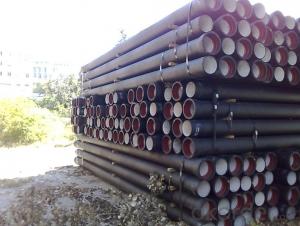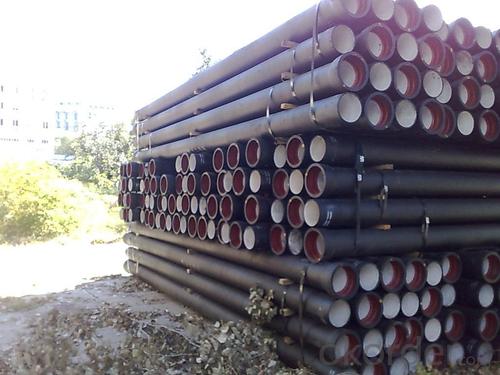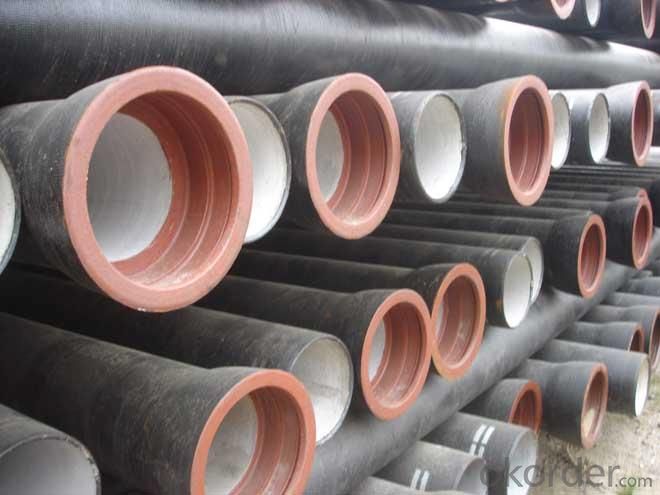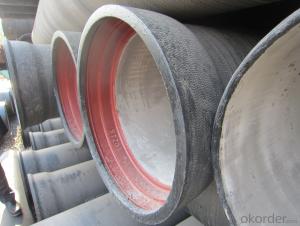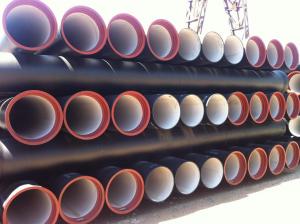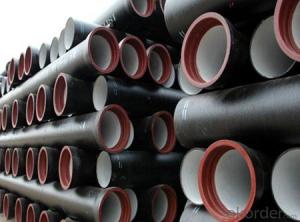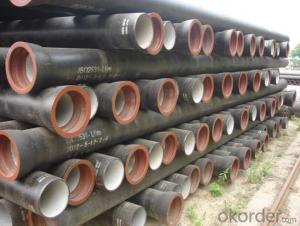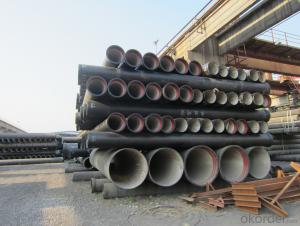Ductile Iron Cast Iron Pipe of China DN400-DN1000 EN545/EN598/ISO2531
- Loading Port:
- China main port
- Payment Terms:
- TT or LC
- Min Order Qty:
- 20 m.t.
- Supply Capability:
- 50000 m.t./month
OKorder Service Pledge
OKorder Financial Service
You Might Also Like
1,Ductile Iron Pipe Description :
1) Pipes confirm to ISO2531,K9 class,T type joint,6m long,with inside cements lining conform to ISO4179, outside Zinc spraying(130g/m2) and bitumen coating(70μm) conform to ISO8179.
2) Pipe ends: Spigot and socket ends, with 100% SBR rubber gaskets accoding to ISO4633
3) we can do third party inspection according to customer's request.
4) Our products have been sold to many international market,such as Middle East and South East Asia and Africa.
2,Main Features of the Ductile Iron Pipe:
Material: Ductile iron grade 500-7/ 450-10 in accordance with ISO1083
Standard: ISO 2531, EN545, EN598, ANSI, AWWA
Certificate: ISO9001, ISO14001, SGS, NSF, WRAS
Test: In accordance with ISO 2531 / EN 545 / EN598 and 100% water pressure test
Length: 6m or cut into 5.6m, 5.7m, 5.8m
Internal Lining: Cement, conform to ISO4179
External coating: Zinc + Bitumen, conform to ISO8179
Rubber: NBR, SBR, EPDM according to ISO4633 / EN681.1
Note: The gaskets, bolts & nuts are supplied respectively as your special requirement
3,Ductile Iron Pipe Images:
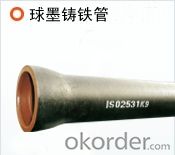
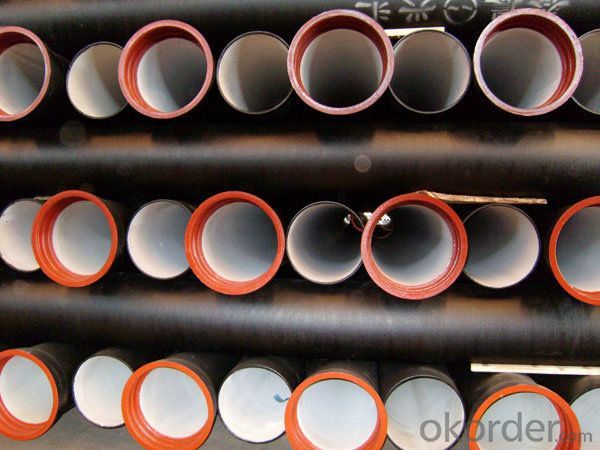
4. Ductile Iron Pipe Specification
Internal lining: ductile iron pipes shall have an internal cement mortar lining in acc with ISO4179.
External coating: ductile iron pipes shall be externally coated with metallic zinc spray plus a further layer of resin painting to ISO8179.
Gasket: 100% SBR/NBR/EPDM rubber gasket in accordance with ISO4633.
Packing: ductile iron pipes from DN100 to DN300 be bundled with steel belts, others are in bulk.
Payment term: L/C, T/T.
Packing: In bulk vessel or in container
5.FAQ:
We have organized several common questions for our clients,may help you sincerely:
1.Q: Why would you choose ductile iron pipe rather than other pipe materials?
A:The reasons are obvious for that not only ductile iron pipe possesses the inherent strength and flexibility of ductile iron, combined with proven corrosion protection systems, but also the cost savings can be achieved from design to installation and commissioning.
2.Q:Why can you guarantee the inner of pipes can’t be corroded?
A: High alumina cement mortar lining and sulphate-resistant cement mortar lining. These two special linings are applicable to inner anti-corrosion for sewage pipes, improving resistance to erosion of the sewage components.
- Q: Can ductile iron pipes be used for underwater installations?
- Yes, ductile iron pipes can be used for underwater installations. Ductile iron is a strong and durable material that is resistant to corrosion, making it suitable for submerged applications. Additionally, ductile iron pipes have excellent joint integrity, ensuring water-tightness even under high hydrostatic pressure. The pipes are often coated with protective linings and coatings to further enhance their resistance to corrosion and extend their lifespan in underwater environments. Overall, ductile iron pipes are a reliable choice for underwater installations due to their strength, durability, and corrosion resistance properties.
- Q: Is the cast iron pipe buried in need of antiseptic treatment? What kind of anticorrosive materials are used?
- Is to put the pipe surface rust corrosion, polished clean, brush again primer, and then wrapped a layer of glass cloth wrapped paint, two layers of glass cloth on the line, the thickness of not less than 6mm, painted with epoxy coal tar paint or asphalt paint
- Q: Can ductile iron pipe be used for water treatment plant applications?
- Yes, ductile iron pipe can be used for water treatment plant applications. Ductile iron pipe is known for its durability, strength, and corrosion resistance, making it suitable for transporting and distributing treated water within a water treatment plant.
- Q: Are ductile iron pipes suitable for trenchless installation methods?
- Yes, ductile iron pipes are suitable for trenchless installation methods. They possess the necessary strength and flexibility to withstand the installation process without compromising their structural integrity. Additionally, their corrosion resistance and durability make them a reliable choice for trenchless installations.
- Q: Can ductile iron pipes be used for underground parking lot drainage?
- Ductile iron pipes are indeed suitable for drainage in underground parking lots. This robust material is frequently utilized in underground piping systems due to its strength and durability. It exhibits exceptional resistance to corrosion, making it an ideal choice for situations where the pipes will come into contact with moisture and water. Furthermore, ductile iron pipes possess considerable tensile strength, enabling them to bear heavy loads and endure the pressure exerted by vehicles in a parking lot. Consequently, opting for ductile iron pipes for underground parking lot drainage ensures a dependable and enduring solution.
- Q: How does ductile iron pipe perform in areas with high soil stability?
- Ductile iron pipe excels in areas characterized by high soil stability, as it possesses inherent strength and durability. This enables the pipe to withstand the soil's pressure without experiencing significant deformation or failure. The exceptional performance of ductile iron pipe is further bolstered by the minimal ground movements, settling, or shifting that is ensured by the stable soil conditions. In regions with high soil stability, the pipe is less susceptible to external forces or stresses that could potentially inflict damage. Ductile iron pipe exhibits remarkable resistance to corrosion, abrasion, and impact, rendering it highly suitable for such circumstances. The material's robustness allows it to endure the weight and pressure exerted by the soil, thereby guaranteeing the pipe's structural integrity over time. Furthermore, the flexibility and joint design of ductile iron pipe contribute to its performance in areas with high soil stability. The pipe's capacity to accommodate slight movements and minor ground shifts without compromising its integrity is advantageous in these stable soil conditions. The restrained joint system utilized in ductile iron pipe installations provides added support and stability, thereby minimizing the risk of pipe dislocation or failure. All in all, ductile iron pipe is a dependable and efficient choice for areas characterized by high soil stability. Its strength, durability, and resistance to external forces equip it to handle the demands of such environments. Additionally, the pipe's flexibility and joint design enable it to adapt to minor soil movements, thereby further enhancing its performance in these conditions.
- Q: What are the different lining materials available for ductile iron pipe?
- Some of the different lining materials available for ductile iron pipe include cement mortar lining, polyurethane lining, polyethylene lining, and epoxy lining. These linings help to protect the pipe from corrosion and extend its lifespan.
- Q: What is the typical weight of ductile iron pipes?
- The typical weight of ductile iron pipes can vary depending on the size and specifications, but they generally range from a few hundred pounds to several thousand pounds per linear foot.
- Q: What are the different types of linings available for ductile iron pipe?
- There are several different types of linings available for ductile iron pipe, each with its own advantages and applications. 1. Cement mortar lining: This is one of the most common linings used for ductile iron pipes. It consists of a layer of cement mortar applied to the interior surface of the pipe. Cement mortar lining provides excellent resistance to corrosion and chemical attack, making it suitable for a wide range of applications, including potable water distribution, wastewater conveyance, and industrial pipelines. It also helps to reduce friction and turbulence within the pipe, improving flow efficiency. 2. Polyethylene lining: Polyethylene linings are often used in ductile iron pipes for applications where corrosion resistance is a primary concern. This lining consists of a layer of high-density polyethylene (HDPE) that is either extruded or sprayed onto the pipe's inner surface. Polyethylene lining provides superior resistance to corrosion, abrasion, and chemical attack, making it ideal for transporting aggressive fluids, such as saltwater, chemicals, or industrial waste. 3. Polyurethane lining: Polyurethane linings are commonly used in ductile iron pipes for applications where enhanced protection against abrasive wear is required. This lining is formed by spraying or pouring a layer of polyurethane onto the inner surface of the pipe. Polyurethane lining offers excellent resistance to abrasion, impact, and chemical attack, making it suitable for conveying abrasive slurries, mining applications, and other high-wear environments. 4. Epoxy lining: Epoxy linings are applied to ductile iron pipes to provide a protective barrier against corrosion and chemical attack. This lining is typically formed by applying a layer of epoxy resin to the pipe's inner surface through a process known as centrifugal casting or electrostatic spraying. Epoxy lining offers excellent adhesion and resistance to corrosion, making it suitable for various applications, including potable water distribution, wastewater treatment, and industrial pipelines. 5. Zinc lining: Zinc linings are used in ductile iron pipes to provide cathodic protection against corrosion. This lining involves applying a layer of zinc to the pipe's inner surface, either through hot-dip galvanizing or by electroplating. Zinc lining acts as a sacrificial anode, corroding preferentially to the iron pipe and protecting it from corrosion. It is commonly used in applications where the pipe is exposed to highly corrosive environments, such as seawater or acidic soils. Overall, the choice of lining for ductile iron pipes depends on the specific requirements of the application, including the type of fluid being transported, the level of corrosion resistance needed, and the potential for abrasive wear. Consulting with industry experts and considering factors such as cost, longevity, and maintenance requirements can help determine the most suitable lining option for a particular project.
- Q: Can ductile iron pipes be used for underground fire protection systems?
- Yes, ductile iron pipes can be used for underground fire protection systems. Ductile iron pipes have excellent strength and durability, making them suitable for withstanding the high pressure and temperature conditions that may occur during a fire. Additionally, ductile iron pipes have a high resistance to corrosion, which is important for long-term use underground. They also provide excellent flow characteristics, ensuring that water can be quickly and efficiently delivered to extinguish fires. Overall, ductile iron pipes are a reliable and effective choice for underground fire protection systems.
Send your message to us
Ductile Iron Cast Iron Pipe of China DN400-DN1000 EN545/EN598/ISO2531
- Loading Port:
- China main port
- Payment Terms:
- TT or LC
- Min Order Qty:
- 20 m.t.
- Supply Capability:
- 50000 m.t./month
OKorder Service Pledge
OKorder Financial Service
Similar products
Hot products
Hot Searches
Related keywords
